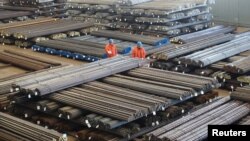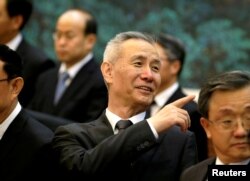Three of President Donald Trump's senior economic aides are expected to meet this week with a top Chinese economic official to discuss trade disputes between the United States and China.
White House spokeswoman Sarah Huckabee Sanders told Reuters that Treasury Secretary Steven Mnuchin, U.S. Trade Representative Robert Lighthizer and Trump's economic adviser, Gary Cohn, are expected to meet Chinese economic adviser Liu He in Washington.
The talks are likely to cover a range of differences including intellectual property and steel.
Trump has long called for a more balanced trade relationship with China and threatened to impose a big "fine" against China to protect American intellectual property. U.S. officials said Trump has been discussing imposing a global tariff on imports of steel from China, the world's largest steel producer, and other countries.
The talks with Liu may help determine the trajectory of the U.S.-Chinese trade relationship, which Trump believes is heavily tilted in favor of China.
A senior U.S. official said there was skepticism on the U.S. side that a trade breakthrough could be achieved any time soon.
"We're trying to treat this with an open mind. But the Chinese don't really want to make a deal. They like the status quo," the official said.
There was no plan for Trump himself to meet Liu, but officials did not rule it out if progress was being made.
Liu, a Harvard-trained economist and trusted confidant of Chinese President Xi Jinping, has emerged as the front-runner to be the next governor of China's central bank, according to sources with knowledge of the situation. Liu is the top adviser to Xi on economic policy and is also expected to become vice premier overseeing the Chinese economy.
Steel
A source close to the White House said Trump had expressed interest in imposing a tariff on steel imports of at least 24 percent. The White House said no final decision had been made.
The Commerce Department on Feb. 16 recommended that Trump impose stiff curbs on steel imports from China and other countries and offered the president several options ranging from global and country-specific tariffs to broad import quotas.
A blanket tariff on steel would cover every steel and aluminum product entering the American market from China.
China has expressed concerns over excessive protectionism in the U.S. steel sector and urged restraint. It has also said it will oppose any "unfair and unreasonable" trade measures by countries such as the United States.






